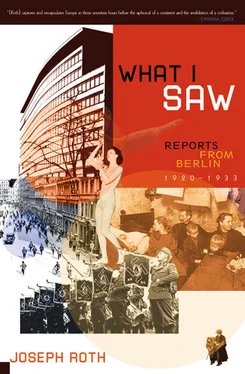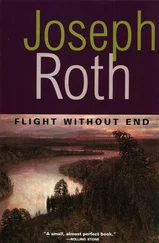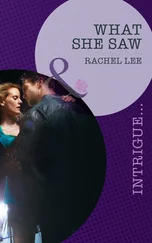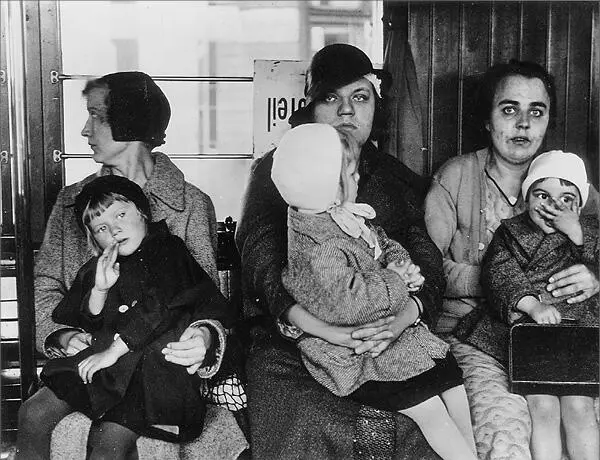
Travelers on the S-Bahn.
Passengers with heavy loads don’t set down their forests when they themselves sit down. Having to pick up one’s load again after a half hour in which one’s spine has felt free for all eternity seems to weigh heavier than an entire pine forest. I know that with us soldiers, when a few minutes’ rest beckoned after hours of marching, we didn’t undo our packs but continued to drag them with us like a horribly loyal misfortune,* or a foe to whom we were bound in an eternal alliance. That’s how these old bundle carriers sit, not so much passengers with heavy loads, as heavy loads with passengers. And that also goes to demonstrate the fatefulness of carrying loads, that it’s a condition rather than an activity. And what do the forest people talk about? They speak in half sentences and stunted sounds. They keep silent not from wisdom but from poverty. They reply hesitantly, because their brains work slowly, forming thoughts only gradually, and then burying them in silent depths no sooner than they are born. In the forests where their work is, there is a vast silence unbroken by idle chatter; there the only sound is that of a woodpecker attacking a branch. In the forests they have learned that words are useless, and only good for fools to waste their time on.
But in the scraps these people do say is expressed the sorrow of an entire world. They have only to say “butter,” and right away you understand that butter is something very remote and inaccessible, not something you spread with a knife on a piece of bread, but a gift from heaven, where the good things of this world pile up as inaccessibly as in a shop window. They say: “Summer’s early this year”—and that means that they’ll be going out into the forests looking for snowdrops, that the children will be allowed out of bed to play in the street, and that their stoves can be left unheated till the autumn.
Actors, who relate their woes in many clever sentences and with much waving of hands and rolling of eyes — they should be made to ride in the cars for passengers with heavy loads, to learn that a slightly bent hand can hold in it the misery of all time, and that the quiver of an eyelid can be more moving than a whole evening full of crocodile tears. Perhaps they shouldn’t be trained in drama schools but sent to work in the forests, to understand that their work is not speech but silence, not expression but tacit expression.
Evening comes, an overhead light goes on. Its illumination is oily and greasy; it burns in a haze like a star in a sea of fog. We ride past lit-up advertisements, past a world without burdens, where commercial hymns to laundry soap, cigars, shoe polish, and bootlaces suddenly shine forth against the darkened sky. It’s the time of day when the world goes to the theater, to experience human destinies on expensive stages, and riding in this train are the most sublime tragedies and tragic farces, the passengers with heavy loads.
Of all the labels and bits of jargon, the verbose or laconic edicts that regulate the bustle of a city, providing information and instructions, offering advice, and constituting law — of all the impersonal formulations in stations, waiting rooms, and the centers of life — this one is humane, artistic, epigrammatic, concealing and revealing its huge content.
The honest man who came up with “Passengers with Heavy Loads” for practical purposes can’t have known that at the same time he found a title for a great drama.
This is how poetry is made.
Berliner Börsen-Courier, March 4, 1923
14. Some Reflections on Traffic (1924)
For the past several months, the question of traffic control has been painfully acute in Berlin. Important stretches of major roads are blocked off to traffic of all kinds. Potsdamer Platz looks like a suppurating wound.* And day after day, night after night, workmen scrabble around. It is now two weeks since the traffic control tower was put up. One had an expectation, perhaps, of something soaring and magnificent. But one day there stood a little gray metal stump of a tower, with large, and at that stage, still-closed round eyes on its top edge. Those eyes, sending out colored beams, were meant to regulate the traffic automatically. But instead the traffic regulator remains the blond, chunky policeman on his wooden platform. In the newspapers there are reports almost every other day of streetcar collisions. (With the compensation sums that are paid out every year to the victims of accidents in Berlin, one could set up a traffic system truly worthy of a great city.) Experts were paid to go out into the world to make studies of traffic systems in great cities. When they got home, they produced a new traffic plan in which a proliferation of confused paragraphs collided like so many streetcars. A few newspapers set up squeals in “Cicero bold”—as if it were they themselves that had been run over. With mighty majuscules* from the arsenal of typesetting, they crushed the new traffic plan. They ran responses from hackney-coach drivers, chauffeurs, bus drivers, and motorists; and if the traffic plan hadn’t been withdrawn, then they would have summoned fresh evidence from people who had little or nothing to do with it: from chimney sweeps, presumably, rat-catchers, hairdressers — why not? — they all would have been solicited for their unprofessional opinions. . It was a chance to prove all over again that they were not going to let up on those in power. It could have been a chance to offer more advice and less of a tongue-lashing. But good advice is as expensive as bad mockery is cheap. .
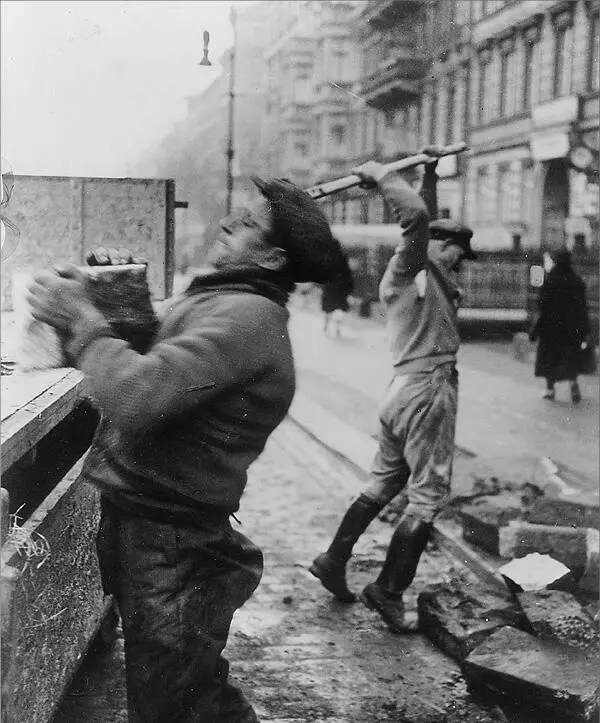
Roadwork in 1930.
I’m not offering my thoughts on traffic in Berlin with the clear conscience of an expert, convinced he has something helpful to say, but with the right of the lay person, who is a victim of the bad traffic and who even faces the prospect of eventually becoming something of an expert in it (given his protracted education in poor conditions and various experiments). By the time the streetcars of this city finally become completely unnegotiable, I’ll probably be able to drive one myself. Today I only know what I see and suffer. And that’s sufficient authority.
It seems to me that the use of streetcars is incompatible with the traffic levels of a metropolis. In an age of air travel they are the equivalent of post coaches. Generally the tracks they run on go down the middle of the street. If there happens to be another vehicle on the tracks, they’re stuck behind it. They block the pedestrian’s view so that he won’t see a vehicle coming toward him on the other side of the street. They stand motionless, as though rigid with fear, for minutes on end, making a wall with little cracks in it through which it would be possible to force one’s way, only one is wary of being swiped by a rapidly approaching car from the other side. This defect of the streetcars is so blatant that even the experts seem to be aware of it. Therefore they are thinking of abandoning the streetcars for omnibuses. But it’s a very long way from having an idea to putting it into practice — a way, as it were, to be covered by streetcar. And in the meantime cars are proliferating, and on December 1 the tax on them is being cut, so that motor cabs will become (comparatively) affordable, thereby adding a further complication to this already highly complicated situation.
Berlin has very few trained traffic policemen. There is no “traffic police” as such, only an administrative department that consists of a few specialist civil servants. Traffic duty is done by regular policemen, as it were, on secondment. And these good and eager fellows tend to wave their arms about with unnecessary, vague flourishes. They aren’t precise, and therefore produce confusion and misunderstanding. In the dark — a further source of trouble and grief — they are hard to make out. They are at constant risk of being run over themselves. Their gray-green uniforms merge into the gray night. They are generally sharp, “bright,” and independent-minded enough to use a little flexibility in the way they interpret the regulations. But they are also called upon to supply information and to bring irate drivers to their senses. And all the time ill-considered newspaper articles undermine the authority of the police, and any heavy-goods driver you ask will invariably claim to be in the right as opposed to the policeman, who can see more of a scene because he is standing right in the middle of it. He ought to be more economical with his movements and gestures. After dark a flashlight would be a useful thing, or, better yet, some proper street lighting. Even some populous and quite central parts of Berlin still look like the deepest and darkest of provinces after nightfall. The economizing of the city authorities must have cost quite a lot of people their lives.
Читать дальше
